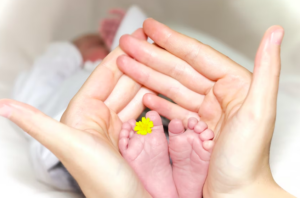There is a lot of conflicting information about postpartum depression and maternal grief.

“You just had a baby! Be Happy”, they say.
And the DSM-V or the Diagnostic and Statistical Manual of Mental Disorders Fifth Edition no longer recognizes postpartum depression. Peripartum depression is currently what the DSM-V recognizes. Peripartum is linked to a major depressive episode that can happen during pregnancy and only within 4 weeks after delivery.
I wonder about this incongruence for the DSM-5. It is basically stating that it will recognize that mothers could potentially be depressed during pregnancy and only 4 weeks after delivering their baby?
Something is off here.
What story does this tell mothers? 
If we go to the basics of empathy or even sympathy in this case, we could imagine ourselves pregnant. We grow a whole child, a whole other being.
We ourselves are a being with a beating heart and care for this child. And then the child is born, hopefully around that 9 month mark, and we no longer have a whole other soul inside of us. And if a child is born sooner there is also grief and layered pieces to that as well. With all of it are complex emotions and experiences with a lot of polarity.
On the one hand a mother could feel joy and delight in the new baby smells and adding a sweet babe to the family. On the other hand, a mother could experience deep grief that her baby is no longer in her body. And there is so much more that can be layered within that.
There can be deep fear how to keep her baby safe. Societies that have the happiest and most supported mothers are the ones that listen and advocate for the mother. The research shows that it is individualized to the specific mother and the ways in which she wants to be cared for. That could mean a mother has her own mother at her home for support. Or that could also be a detriment to another mother who feels more burden when her mother is around. 
A new mother may feel safe in holding her baby all the time and not letting anyone else hold the baby. Another mother may need more separation from her baby and free to let others hold them.
The first step towards destigmatizing the time after baby is born is to make sure the mother’s voice is heard and the actions are carried out.
Be delicate and have a strong backbone if you are advocating for mothers. If you are worried about what your in-laws think about your wife or partner and the state she’s in or the support she needs, don’t.
Release other people’s wants and needs during this time. It is such a precious and quick and wild time. 
Be mindful of what the mother needs right now and let go of pleasing others because it will be at the detriment of a mother’s mental health.


